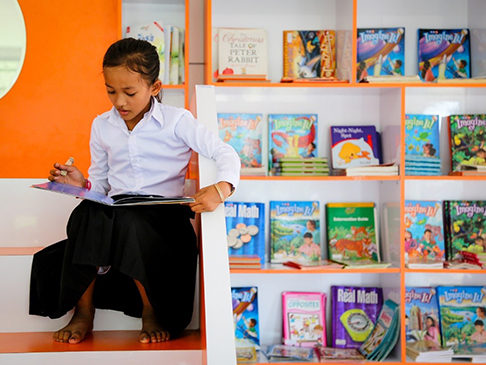Impact stories
At a basic level, literacy is the ability to read and write – the foundation of learning and education. However, it is also a human right and a powerful tool for individual and community empowerment – being a catalyst for human and social development, poverty eradication, peace and democracy.
In Cambodia, many young learners have poor literacy skills. There are several reasons for this. Children often have limited classroom time as many teachers are underpaid and have to work multiple jobs, and students also have limited access to quality libraries and school resources. In addition, there are few literacy programs or interventions available inside or outside the classroom. As a result, many students in rural schools don't have adequate opportunities to practise their reading.
To address this, ChildFund has set up the Easy2Learn Project. This innovative new project features a child-to-child reading method aimed at improving literacy in rural communities in Cambodia. ChildFund uses mobile technology to help children, particularly girls, learn literacy skills more effectively. Older student tutors are paired with younger student learners to help them read and write using special reading toolkits and tablets. In addition, outdated school libraries are being redesigned to make them more fun and appealing for students to use.
For slow learners, this informal support network means tutors can explain concepts more simply and in a private environment, with no pressure from teachers. Children are more comfortable and confident, and learn more quickly and effectively. In this sense, children themselves become an important resource in improving the quality of education in schools.
This program has also been of huge benefit for teachers, with the School Director in Svay Phaem noting: "I'm relieved as I no longer have to worry as much about students' reading abilities. The older tutor students are very good at teaching the younger students in a way they find interesting and enjoyable. I can see that many more students' reading abilities are getting better."
Recent results from the Early Grade Reading Assessment (EGRA), an international-standard test designed to measure the basic foundation skills for literacy acquisition, highlights the improvements that have already been made – with the reading scores of Grade 1 students tested doubling from a baseline of 7% to 14%, and Grade 2 scores almost tripling from 9% to 25%.
This project not only promotes literacy, but teaches leadership skills, and develops respect, teamwork and friendship among the student body. "I feel satisfied and happy to teach and learn through this program, as I've never had the opportunity to help several students with their Khmer, like I do now," says Rina, a student tutor. "I feel like I have a good relationship with my younger schoolmates, and feel very proud with what I am doing. I'm so happy to see that the students I've been assisting are improving!"
ChildFund works in partnership with local NGO Kampuchean Action for Primary Education (KAPE), and is supported by the Australian Government through the Australian NGO Cooperation Program (ANCP).

